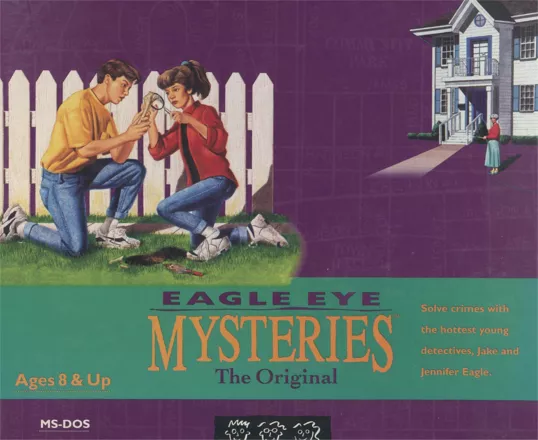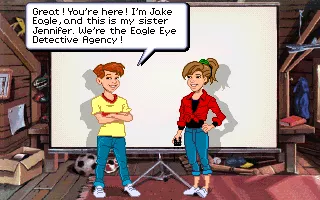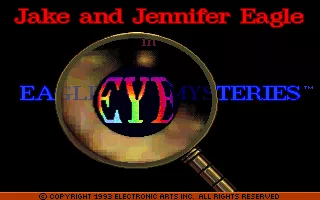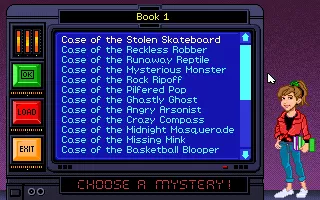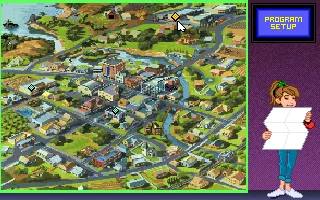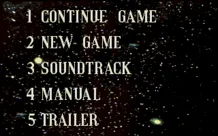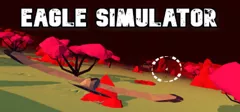Eagle Eye Mysteries
Description official description
Eagle Eye Mysteries is an educational game which incorporates some unique gameplay ideas not seen in many other games. A bit like Law and Order for kids, the game has over 50 different mysteries to solve, ranging from missing items to dug up skeletons to mysterious sea monster sightings to sculpture forgeries.
With the help of Jake and Jennifer Eagle, you must interrogate suspects, gather information, and then decide on the culprit. Though intended to help improve reading comprehension and problem solving skills, Eagle Eye Mysteries can be a challenge for adults as well.
Groups +
Screenshots
Credits (DOS version)
39 People (36 developers, 3 thanks) · View all
| Design |
|
| Story Writing | |
| Programming | |
| Character Design and Animation | |
| Backgrounds and Illustrations | |
| Director | |
| Art Director | |
| Technical Director | |
| Educational Consultant | |
| 3-D Model Design | |
| Additional Programming | |
| Voice Talent | |
| Original Music | |
| [ full credits ] | |
Reviews
Critics
Average score: 86% (based on 2 ratings)
Players
Average score: 3.6 out of 5 (based on 7 ratings with 1 reviews)
The "kid detective topos" lives
The Good
The starting point of "Eagle eye Mysteries" is simple: the teenage siblings Jennifer and Jake Eagle, with some help from an adult friend, have founded a detective agency in the American town of Richview. Leaving aside the issue of how realistic it is (police cooperating with minors, minors being formally allowed to work... in real life it could even mean legal trouble for their parents, even if the kids are never really in danger - they mostly solve cases of petty crimes, such as thefts or frauds, or even not really crimes, such as something disrupting a dog show), the very idea already forms the basis for some creative solutions.
First, it's a specific kind of adventure game: not a "quest" with a linear plot, but a series of episodes, each one dedicated to a single case. The strength of a good adventure game is creating its own environment: the area, the people, who are immediately recognised not just by their name and appearance, but also by their personality... And "Eagle Eye Mysteries", despite its episodic nature, which prevents longer contact with other characters (we only talk to them for a longer while, only a few people appear in each case...), has a bit of that: it is able to individualise the characters a bit. For example, Mark Moriarty is immediately shown as the local teenage troublemaker who is always up to no good.
Richview itself seems fictional, but becomes an interesting area due to several places, such as library, parks, hotel, video game arcade, a local historical society or even a mad (or rather just wacky) scientist's fake castle. These environments are beautifully drawn. While they are very static compared to ordinary adventure games, there is anyway a fair number of them. Despite their completely static character within a single case, they change from case to case - for example the local shopping mall may host temporary stands, such as one belonging to the seller of baseball memorabilia or a space exploration exhibition. Character portraits, shown during conversations, are also very interesting - it's fascinating how cute (Cheryl Hane, Silvia Torres) or just agreeable and realistic (farmer Duffy) are some of the characters.
"Eagle Eye Mysteries" is also a specific kind of educational game. It mostly teaches something very basic: the art of logical thinking. This is what the whole game is about: to arrive at the "whodunnit" conclusion, we have to research the case, look closely at objects (a very tiny detail: in one case Jennifer/Jake tries out a few machines at the school gym, to see whether they could have lately been used by another kid, or rather only an adult), analyse statements by witnesses and suspects, decide which clues point at the culprit and which are irrelevant or even just red herrings. However, at the same time the game also sneaks in some information on several topics, such as history, literature, but also for example geology (a very tiny spoiler: in one case an important detail is what kinds of rocks can be found on the moon). So it's an opportunity to absorb, almost unconsciously, knowledge in many different areas.
The Bad
The developers have tried, as it clearly seems, to make the game more immersive by introducing the player as an in-game character. You type in your name and you begin cooperation with Eagle Eye Detective Agency. And I find it... not a very good idea. First, you always directly work with only one of the siblings (although, you can switch between them - still I chose Jennifer because I'm a feminist and I want girls, women and other females to be recognised as fully capable and interesting individuals who can be protagonists in texts of culture). The other just appears to take very little part in the investigation. And even the one you're working with... he or she will appear on the screen, you can ask the kid for clues, but still the impression remains that you are doing the work for them. So why are they Eagle Eye Detective Agency and not [enter your player name] Detective Agency?
It reminded me of the puzzle-simulation games "Gardenscapes". The starting point of the first game: you, the player, have inherited a house and now you are working together with Austin the butler on restoring the garden to its former splendour. But in the later games Austin is developed as a character to the point when he, in my opinion, seems no longer credible as a mere servant. Because of this my opinion on this aspect of games such as both "Eagle Eye Mysteries" and "Gardenscapes", in form of unspoken advice to the developers, is: at the price of the immersive aspect, make your direct helper the player-controlled character (Jennifer and/or Jake in "Eagle Eye Mysteries", Austin in "Gardenscapes"). Unfortunately, it wasn't done, but in my opinion the lack of such a decision makes several aspects of the game seem rather artificial.
The game saves automatically after completing each case. I have nothing against it in principle - at least I don't have to remember about saving. However, it means that later you can't return to previously solved cases. I think that for that, you'd need a new player profile. It strongly - automatically, in fact - limits the game replayability. It's a pity, because it was indeed an interesting game.
This topic is closely related to another aspect of the game: its division into three "books". However, as we soon find out: the content of these books largely repeats itself. Part 1 and 2 have 24 cases each, but the whole second "book" has the same cases, with just details and hence the solution being different (together with another little impediment: now we need to select only four clues, not five like in the first "book". "Book 3" selects just six cases, with details differing more substantially from the ones in "books" 1 and 2 (and the number of clues to choose further limited to just three). It makes the game a little boring, repetitive. And of course, as I said, there's no going back to previous cases, even after having finished every single one.
The Bottom Line
It's fascinating how durable is the "kid detective topos". I have seen several examples of this in literature and games - children conductive more or less formal investigation, sometimes to the point of officially cooperating with the local police... And in real life a police officer would be likely to ignore children, perceive them as untrustworthy witnesses and an investigation done by children - as interference in police matters. This way, stories about kid detectives play an important role: they give children a sense of self-esteem in a world where many adults almost treat them as not yet people ("Children and fish have no voice", according to a Polish saying; or disturbingly large social support for corporeal punishment and claims that spanking doesn't qualify as "beating children"...). In "Eagle Eye Mysteries" this empowerment of children is sometimes drawn to absurd: children solve cases which had left the police stumped, even if clues often seem obvious... Unfortunately, making adults seem stupid sometimes becomes inevitable in educational games.
Despite this, the game can also be interesting to adult players. But be prepared for a lot of things being too obvious. Which doesn't mean that the game is never a challenge - in fact, the most challenging aspect is choosing the most relevant clues when more seem right. This aspect becomes even more prominent as the number of clues to select is reduced in subsequent "books" - the final one is already quite challenging.
DOS · by Nowhere Girl (8782) · 2019
Analytics
Identifiers +
Contribute
Are you familiar with this game? Help document and preserve this entry in video game history! If your contribution is approved, you will earn points and be credited as a contributor.
Contributors to this Entry
Game added by Zack Green.
Macintosh added by Kabushi.
Additional contributors: formercontrib, firefang9212.
Game added July 23, 2004. Last modified June 1, 2024.


